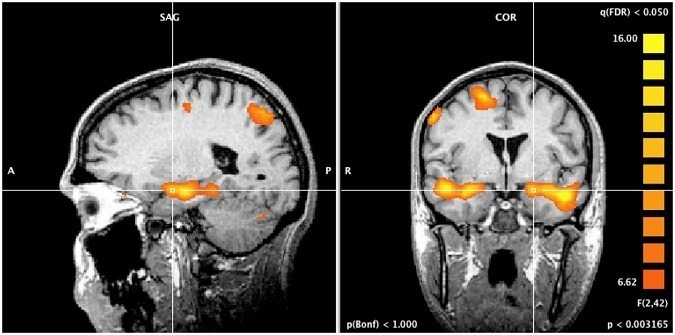Study: Cognitive Behavioral Therapy (CBT), not medication, drives long-term rewiring of the brain to help reduce psychosis symptoms
 Talking therapy changes the brain’s wiring, study reveals for first time (ScienceDaily):
Talking therapy changes the brain’s wiring, study reveals for first time (ScienceDaily):
“A new study from King’s College London and South London and Maudsley NHS Foundation Trust has shown for the first time that cognitive behaviour therapy (CBT) strengthens specific connections in the brains of people with psychosis, and that these stronger connections are associated with long-term reduction in symptoms and recovery eight years later.
In the original study, participants underwent fMRI imaging to assess the brain’s response to images of faces expressing different emotions, before and after six months of CBT. Participants were already taking medication when they took part in the study, and so were compared to a group receiving medication only. The group receiving medication only did not show any increases in connectivity, suggesting that the effects on brain connections could be attributed to the CBT…
For the new study, the health of 15 of the 22 participants who received CBT was tracked for eight years through their medical records…The results show that increases in connectivity between several brain regions — most importantly the amygdala (the brain’s threat centre) and the frontal lobes (which are involved in thinking and reasoning) — are associated with long-term recovery from psychosis. This is the first time that changes in the brain associated with CBT have been shown to be associated with long-term recovery in people with psychosis.”
Study: Brain connectivity changes occurring following cognitive behavioural therapy for psychosis predict long-term recovery (Translational Psychiatry)
- From the abstract: Little is known about the psychobiological mechanisms of cognitive behavioural therapy for psychosis (CBTp) and which specific processes are key in predicting favourable long-term outcomes. Following theoretical models of psychosis, this proof-of-concept study investigated whether the long-term recovery path of CBTp completers can be predicted by the neural changes in threat-based social affective processing that occur during CBTp. We followed up 22 participants who had undergone a social affective processing task during functional magnetic resonance imaging along with self-report and clinician-administered symptom measures, before and after receiving CBTp…findings show that reorganisation occurring at the neural level following psychological therapy can predict the subsequent recovery path of people with psychosis across 8 years. This novel methodology shows promise for further studies with larger sample size, which are needed to better examine the sensitivity of psychobiological processes, in comparison to existing clinical measures, in predicting long-term outcomes.
To learn more:


